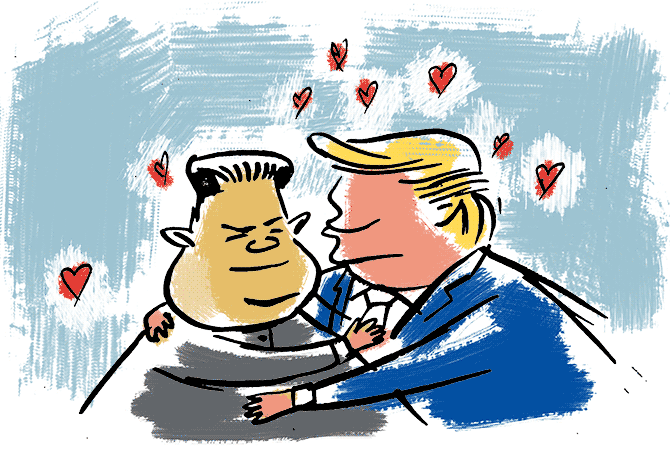'Countries in possession of nuclear weapons have a heightened sense of power and it is logical for Kim to expect/demand to be treated as an equal at any bargaining table.'
'It is here that Trump ought to respect Kim as the leader of a sovereign power and not treat the North Korean leader as a subordinate,' says Dr Rajaram Panda.
After generating much hype about a possible breakthrough on North Korea's nuclear weapon problem through a summit with North Korean leader Kim Jong Un on June 12 in Singapore, in a three-paragraph terse letter that began 'Dear Mr Chairman,' US President Donald J Trump pulled out of the planned summit, blaming 'tremendous anger' and 'open hostility' from North Korea.
Further, Trump threatened to use nuclear weapons if necessary. In the letter, he also said, 'If you change your mind having to do with this most important summit, please do not hesitate to call me or write.'
Trump described the cancellation of the summit as 'a tremendous setback' for North Korea and warned that the US military is ready to act should Pyongyang take any 'foolish and reckless' action.
Hours later, Pyongyang said it was ready to meet with the US 'at any time'.
Following this, Trump quickly responded, saying that the proposed meeting with Kim, which he had cancelled a day earlier, could still go ahead on June 12.
Such a casual manner of conducting diplomacy smacks of immaturity by the leader of the sole superpower bordering on recklessness, no different from the much maligned North Korean leader.
The manner in which negotiations have been going on since Kim's peace overtures, it does not appear surprising to observers of Korean affairs that Trump pulled down the curtain.
Though the window has currently been kept open, it is difficult for one to take an optimistic view for the future.
So long as Washington insists on 'complete, verifiable and irreversible denuclearisation' of North Korea, and Pyongyang vows never to give up its nuclear deterrence until it feels safe from what it terms US aggression, no tangible outcome can ever be expected.
The reactions from the stakeholders were on expected lines. Confused by Trump's cancellation, there was a sense of disappointment and deep concern.
United Nations Secretary-General Antonio Guterres urged both parties to continue dialogue to find a path towards the verifiable denuclearisation of the Korean peninsula.
South Korean President Moon Jae-in -- who initiated the peace process and called Trump's action 'very regrettable' -- met with Kim on Sunday, May 27, exactly a month after the leaders of the two Koreas met for the first time on April 27.
'Denuclearisation of the Korean peninsula and enduring peace are historic tasks that cannot be abandoned or delayed,' Moon said. 'The sincerity of the parties who have tried to solve the problem has not changed.'
Though China did not react immediately, Hu Xijin, editor, Global Times, the newspaper owned by the Chinese Communist party, which reflects official thinking, was critical of Trump.
Trump's announcement cancelling the Singapore summit came just hours after Pyongyang dismantled its nuclear site in the presence of international journalists.
Though talks with North Korea were always desirable and worth pursuing, considering the manner in which they were being worked out, the prospects for a one-on-one summit always looked fragile.
If Trump -- who says the summit may still go ahead -- decides to finally cancel, he risks souring ties with South Korea as Seoul could start perceiving Washington as an untrustworthy ally. Moon may then tilt more towards China.
If both China and South Korea urge a lifting of sanctions against North Korea, should Trump continues to waver, Japan will feel more isolated. That could lead Japan to rethink its own options, including bolstering its defences as well as developing nuclear weapons.
Though such a scenario does not currently appear possibile, in the long run it may not be unthinkable.
This makes a serious case for Trump to rethink his Korea policy, including assuring China and the US's two Asian allies that he is still open to serious talks.
Now that Kim has indicated his willingness for talks anytime and anywhere, it would be a serious mistake if Trump remains rigid in his demand.
Unless both sides sit across the table it would be difficult to know who concedes how much so that a mutually agreeable agreement can be explored.
Not only should Trump cease his belligerent statements and threats to use nuclear weapons and order his officials not to indulge in fiery rhetoric, he should be more considerate about Pyongyang's demands and see what emerges at the summit.
The US, not North Korea, should be seen as the party most committed to a peaceful resolution of the issue.
Countries in possession of nuclear weapons have a heightened sense of power and it is logical for Kim to expect/demand to be treated as an equal at any bargaining table.
It is here that Trump ought to respect Kim as the leader of a sovereign power and not treat the North Korean leader as a subordinate.
Continuous nuclear threats, bluster and bullying on trade and other foreign policy issues are always counterproductive.
Despite North Korea's limited access to the outside world -- either by choice or engineered isolation by the world -- Pyongyang is not entirely friendless.
North Korea has survived despite global sanctions and China will ensure that the nation does not collapse ever.
A divided Korea suits Beijing and it would be foolhardy to expect any change from such a position. So, Trump will need help.
Though Japan and the US have been on the same page on North Korea, the situation can alter dramatically if Japan suddenly confronts an unpleasant security situation.
Annoying China would also be unwise for Trump.
Trump may be worried about the balance of trade excessively in China's favour, but if he links trade with enforcement of sanctions against North Korea, it would be unwise because enforcing sanctions is a UN obligation, not only that of the US.
Against this background, a negotiated settlement is the only desirable route to secure peace on the Korean peninsula.
In order to make that possible, Trump needs to be ready to accept something less than complete and irreversible denuclearisation.
This is not what the US wants, but it would at least reduce the North Korean threat to more manageable levels.
In order to do that, Trump and his advisors need to be more sophisticated in their choice of words and language, and not say something that could infuriate the North Korean leader.
The North Korean issue is not simple and there cannot be a quick-fix solution.
If a trigger-happy Trump does not change track, an unintentional conflict could break out on the Korean peninsula and assume a global dimension.
Should Trump choose to be more suave, more patient and more tolerant, he could be in a position of strength to deal with world issues.
The choice is Trump's, not Kim's.
Dr Rajaram Panda, former Senior Fellow, IDSA, was until recently ICCR Chair Professor at Reitaku University, Japan.












 © 2025
© 2025